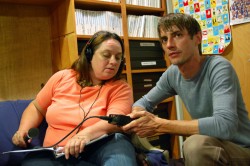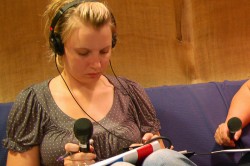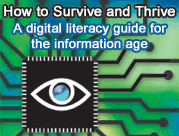![]()
Contact:
.(JavaScript must be enabled to view this email address), Project Manager
![]()
- Oct. 12: Sacramento Citizen Journalism Contest
- Sep. 10: YourHub.com users can benefit from new association
- Aug. 25: The Value of Rural News
In Kentucky, Boosting Local Coverage with Radio Recruits
![]()
Community Correspondents Corps, Whitesburg, Kentucky
Organized by Appalshop, a non-profit arts and education center
![]()
The Idea:
Since 1985, Appalshop has operated a community radio station, WMMT 88.7 FM, which relies heavily on volunteers to produce programs and content for listeners across Eastern Kentucky. Project Manager Mia Frederick said the Community Correspondents Corps grew out of a desire to have more local news programming on air and to encourage comprehensive coverage in a region that frequently is the subject of negative media portrayals.
Launched in fall of 2006 with a grant from J-Lab’s New Voices program, Appalshop’s Community Correspondent Corps offers area residents the chance to learn interviewing techniques, journalistic standards and how to operate basic radio equipment. Stories produced by the citizen correspondents are being aired on WMMT and archived at the project’s web site.

Trainer Robert Salyer (right) teaches citizen journalist Debbie G. Stidham how to operate recording equipment.
“It’s all about having a voice,” Frederick said. “Not only seeing issues that are of concern and interest to the community being covered - and being covered by people who are actually engaged and care about these issues - but also when this area does get (outside) media coverage, it’s a mediated kind of coverage, and its often not satisfactory, it doesn’t feel accurate, doesn’t feel complete to the people who are impacted.”
The Training:
Training sessions consisted of weekly, two-hour meetings during October and November 2006. Participants learned interviewing techniques, the standards and practices of good journalism, tips on writing copy for radio, and how to use basic recording and sound editing equipment.
The program issues reporting kits, including digital recorders, microphones, and headphones, for community correspondents to use in their reporting. Correspondents edit their work at the Appalshop studios, where they also can seek one-on-one coaching from Appalshop and WMMT staffers and other volunteers.
Program organizers plan to create an editorial advisory board to further assist the citizen journalists in their reporting work. They also plan to involve faculty members from the journalism department at Eastern Kentucky University in Richmond, Ky., in future training sessions.
The Recruits:
Eleven community correspondents are listed on the program’s web site. They include teachers, community activists, Appalshop volunteers, and a trained folklorist. Frederick said about five have continued to be active correspondents.

Citizen journalist Lora Smith prepares for radio reporting.
The first round of trainees was recruited through word of mouth, Frederick said. For future training programs, she plans to advertise the program on air or through other local media outlets.
The Results:
The first reports were in the works in late 2006. One correspondent was producing a piece about grandparents who suddenly find themselves raising their grandchildren full time. “The biggest thing that we’re coming up against in terms of actually getting content produced is the method that we’re working with,” Frederick said. “Being radio, it just isn’t as simple as people going out with their camera phones or digital point and shoot cameras and putting something up online.”
All completed reports will be archived here.
“If a year from now we have produced some good news and some good stories that have gotten people to get in touch with us or respond in some way, I think it will have been a success,” Frederick said.
PREV: In Kansas, Opening the Newsroom Doors to Citizen Journalists
NEXT: In Massachusetts, Senior Citizen Journalism Serves as Model





Comments
Be the first to leave a comment on this page!